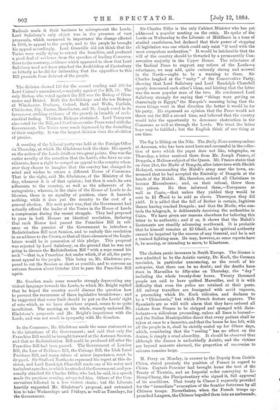A meeting of the Liberal party was held at the
Foreign Office on Thursday, at which Mr. Gladstone took the chair. His speech on the action of the Lords dwelt on two great points. One was the entire novelty of the assertion that the Lords, who have no con- stituents, have a right to compel an appeal to the country when- ever they choose to imagine that the country has changed its mind and wishes to return a different House of Commons. That is the right, said Mr. Gladstone, of the Ministry of the day, whenever it is of that opinion ; but then it sends its own adherents to the country, as well as the adherents of its antagonists ; whereas, in the claim of the House of Lords to do likewise, there is no equality of position, since it hazards nothing, while it does put the country to the cost of a general election. His next point was, that the Government had actually offered the leader of the Tories in the House of Lords a compromise during the recent struggle. They had proposed to pass in both Houses an identical resolution, declaring that each House had passed the Franchise Bill in reli- ance on the promise of the Government to introduce a Redistribution Bill next Session, and to embody this resolution in an address to the Crown, so that all three elements of the Legis- lature would be in possession of this pledge. This proposal was rejected by Lord Salisbury, on the ground that he was not going to discuss the Redistribution Bill " with a rope round his neck "—that is, a Franchise Act under which, if at all, the party must appeal to the people. This being so, Mr. Gladstone pro- posed to cut the Session as short as possible, and to convene an autumn Session about October 21st to pass the Franchise Bill again.
































 Previous page
Previous page